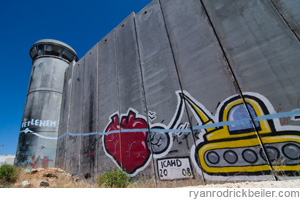E piphany has passed as well as Coptic Christmas earlier in January. A beautifully carved olive wood figure I bought in Bethlehem a couple of years ago titled "The Flight to Egypt" is the last of my Christmas decorations. It is on the TV so I am reminded that the joy of the shepherds and wise men soon becomes the challenge of becoming a refugee, fleeing what is known for the unknown -- all for the life of a newborn son.
piphany has passed as well as Coptic Christmas earlier in January. A beautifully carved olive wood figure I bought in Bethlehem a couple of years ago titled "The Flight to Egypt" is the last of my Christmas decorations. It is on the TV so I am reminded that the joy of the shepherds and wise men soon becomes the challenge of becoming a refugee, fleeing what is known for the unknown -- all for the life of a newborn son.
Bethlehem, the city where Jesus was born, was not a peaceful place. It was shocking for me to see the bullet holes in the Church of the Nativity left from the Israeli bullets in 2003 and the Wall encircling the sacred town. My heart was heavy as I heard the stories from Parents Circle -- Jewish parents, Muslim parents, and Christian parents who have all lost a child or family member during the conflicts. And my heart broke to see children so traumatized they can't speak at Sister Rose's ministry.
But why should I have been so surprised? Bethlehem was not a city of peace when Jesus was born. In the Church of the Nativity is also the Chapel of the Innocents -- a reminder of the children under age 2 who were slaughtered by Herod.
Jesus escaped this slaughter by fleeing to Egypt. Since I was a child I have known the holy family fled to Egypt. But the details of the trip and where they stayed never entered my mind. I just jumped ahead to Galilee and the ministry of Jesus.
This past summer I went to Egypt and visited the area in Cairo where the holy family went, now in Old Coptic Cairo. A synagogue is at the heart of the area! Duh! When Jesus and his parents fled to Egypt, they came to this synagogue and an established Jewish community. Double duh!
The old stories say that the rabbi and congregation assisted them with a place to live only a block or so away from the synagogue. Because they were refugees and had no network or connections, the established community must have helped Joseph set up his carpentry business as a way for them to make a living.
Refugees often seek a place where people of their faith or tradition live in a new land. They seek that which is familiar among that which is unfamiliar. They receive support and understanding rather than discouragement or hatred.
The tale of refugees through the ages follows a similar story. Refugees seek a new place because of displacement following war, famine, or persecution. Refugees abound in our world today.
Governments where refugees flee to are met with abundant problems and concerns. Responses vary. Jordan and Lebanon opened their borders to Palestinians displaced following the formation of Israel. Egypt hosted 50,000 Palestinian refugees displaced from the West Bank and Gaza by the 1967 Arab-Israeli War.
Recently, another response to the challenges of refugees came from Israel.
"I decided to close Israel's southern border to infiltrators and terrorists after prolonged discussions with government ministries and professional elements," Prime Minister Benjamin Netanyahu said in a statement Sunday, Jan. 10, 2010. "This is a strategic decision to ensure the Jewish and democratic character of the state of Israel."
"Israel will remain open to war refugees, but we cannot allow thousands of illegal workers to infiltrate into Israel via the southern border and flood our country," he added.
Thousands of African and other migrants have come to Israel through its porous border with Egypt over the last few years, fleeing conflict or searching for a better life in Israel. Israel's Hotline for Migrant Workers, a group that promotes the rights of undocumented workers, puts the number at "a few thousand" a year.
Costing 1 billion shekels ($270 million), the barrier project will take two years to complete. A controversial barrier already separating the West Bank from the Jewish state is currently over 400 km (248.5 miles) in length. In December Egypt began building an underground wall along its border with the Gaza Strip to stem Palestinian arms smuggling through tunnels.
Barriers can be built but don't always offer security. Alon Liel, a professor at the University of Tel Aviv and former director-general of the Israeli ministry of foreign affairs stated to Aljazeera News that the construction of another wall would not be "a very pleasant feeling" for Israelis. "About 50 to 60 percent of our borders are already sealed," he said. "We are surrounded by fences along our border with Lebanon, Jordan, most of the West Bank, all of Gaza. It's a very unpleasant feeling, but for the Israeli public the alternative to not having a fence seems worse." (4)
If the Holy Family were to flee to Egypt these days, it would be a trip fraught with danger. Barrier walls and fences already bar the way out of Bethlehem. Soon the border into Egypt will be sealed also.
The challenges of refuges remains and humanitarian help is needed. What groups of refugees live in your community? What are some ways you or your faith community is meeting those challenges? How can governments respond humanely?
Patricia Edwards-Konic is a Friends minister and past Editor of Quaker Life magazine. She is currently freelancing in Colorado to be near family. Her e-mail address is pekonic@gmail.com and she can be found on Facebook.
Got something to say about what you're reading? We value your feedback!